The “K” LINE Group has established the Charter of Conduct for the “K” LINE Group Companies, a code of conduct that is to be observed by the entire Group, and we will consistently respect the individuality, personality and diversity of our Group employees. And "K" LINE has established the implementation guidelines for putting the sprit of the Charter of Conduct, ”K” LINE will strive to ensure that employees are treated equally without discrimination on any grounds, including but not limited to nationality, race, ethnicity, gender, sexual orientation, gender identity, creed or religion, disability, etc., in terms of employment and worker treatment.
In order to create an environment in which everyone can fully demonstrate their individual abilities while balancing work and family life, we formulate the following action plan with the aim of becoming a company where all employees can work with a sense of motivation and self-confidence.
April 1, 2025 – March 31, 2027
Goal 1 (Goal to provide opportunities related to work life)
Increase the percentage of female employees in managerial positions to 15% by the end of the plan period.
Goal 2 (Goal to balance work life and family life)
Limit the average monthly overtime working hours per employee to less than 30 hours.
Goal 3 (Goal set under the Act on Advancement of Measures to Support Raising Next-Generation Children)
Increase the percentage of male employees taking leave for childcare to 50% or more.
Goal 4 (Goal set under the Act on Advancement of Measures to Support Raising Next-Generation Children)
Ensure that the total number of days off taken, combining annual paid leave and the company’s unique non-statutory leave (up to 7 days within the fiscal year), is at least 12 days.
Please refer to the following for details on specific initiatives.
As work styles become more diverse, ensuring that employees can maintain a good work–life balance is integral to encouraging employee skill development and to spurring the sustainable growth of the “K” LINE Group. We have adopted flexible workstyles as a measure to allow employees to continue working amid the changes that accompany different life stages, such as flex time and a teleworking system. In addition, we offer robust systems for supporting employees, including maternity, childcare, and long-term care systems that surpass legal requirements.
Although not stipulated by law, we granted for up to 18 months.
Reduced working hours granted during pregnancy.
Hospital visits granted during work hours.
Although the legal requirement is 6 weeks before the due date, we granted from 8 weeks before the due date.
We granted until the child turns 3 years old, but the legal standards granted until turns 2 years old.
Although not stipulated by law, we granted for 5 to 10 working days.
More than the legally required number of days, we granted up to 7 days per year when taking care of 1 family member and up to 12 days per year when taking care of multiple family members.
Loan program: Although not stipulated by law, it is available for an employee who has a preschool child or a person requiring nursing care in their family.
Reduced working-hour program : Although the legal only allows employees up to the age of elementary school entry, we ganted until a child completes the third grade of elementary school to work shorter hours by up to two hours.
Introduced by various divisions, with core hours of 11 A.M. to 3 P.M.
Although not stipulated by law, it is available to take 7 consecutive days of refreshment leave in the 11th year at the company, and 10 consecutive days in the 21st year.
Although not stipulated by law, we granted for 2 years for an overseas assignment or 1 year for a domestic assignment.
“K” LINE was evaluated for its proactive measures to support the balance between work and raising children and received Kurumin 2022 certification (for its efforts from April 1, 2019, to March 31, 2022), as a childcare support company by the Tokyo Labor Bureau of the Ministry of Health, Labour and Welfare. We also received Kurumin certification in 2016 and 2020.
In addition, KMDS CO., Ltd., one of our consolidated subsidiaries, achieved Kurumin 2021 certification, for its efforts from April 1, 2017, to March 31, 2020. Women comprise 90% of employees at this company, which is engaged in trade administration including documentation for ocean freight transportation, outsourced contracting, and worker dispatching services. We are striving to improve the working environment and diversify workstyles so that both women and men can play an active role.
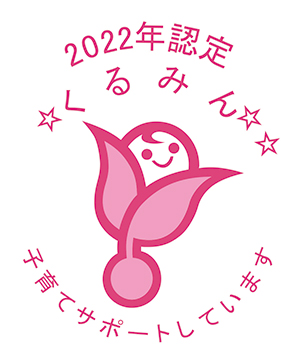
Female maritime officers at “K” LINE build their careers in various fields while adjusting to their respective lifestyles, whether working at sea, onshore (including overseas assignments), or through flexible, shorter working hours. Assignments are made regardless of gender, allowing individuals to fully utilize their skills and experience as deck officers or engineering officers.
As part of our efforts to reform work styles at sea, we have established systems to accommodate the life events of maritime officers flexibly. Specifically, we have created a new system that allows employees to apply for temporary onshore assignments when sea duty becomes difficult due to childbirth, childcare, or nursing care. We also respect individual preferences regarding childcare leave, allowing them to take leave as they wish.
These initiatives aim to create an environment where all maritime officers can work with peace of mind, respond flexibly to individual life events, including family matters, and maintain a good work-life balance.
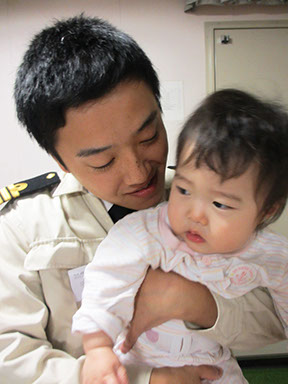
To help our maritime officers work with peace of mind despite being far away from their families, we established onboard internet access enabling individuals to use smartphones and computers to contact their families and friends via email, social media, and other apps. We also help cover travel and accommodation expenses so that the families of maritime officers can come to our vessels when they berth at ports in Japan and overseas.
In addition, we have established a system allowing families to board our vessels during certain periods.
Since ship-based living quarters and working environments are so close together, seafarers need to be able to adjust between being on duty and off duty. We endeavor to help seafarers take proper rest in various ways, including giving them opportunities to exercise, read books, and watch movies in their free time, and our vessels include onboard gymnasiums and recreation rooms to help seafarers keep fit, the cost of which we subsidize by purchasing recreational equipment. Moreover, each vessel has free WiFi.
Daily meals play an important role in ship-based living, and for this reason we employ non-Japanese cooks to prepare onboard meals. Our cooks are trained at the “K” Line Maritime Academy (in Manila, the Philippines), underscoring our efforts to provide well-balanced, highly nutritious meals for our seafarers on our vessels. We also provide crew members on each vessel with recipe books of their national cuisine so that they can eat a wide variety of meals.
In order to create a bright and pleasant working environment for our seafarers, from time to time we organize recreational tournament and other events for all crew members to participate in.
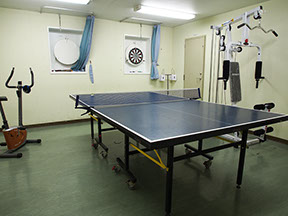
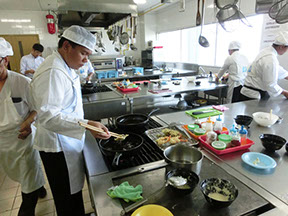
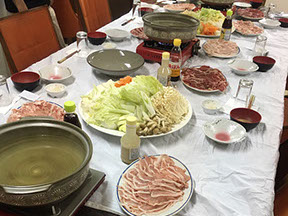
As our group company which develops businesses globally, approximately 97% of its crew members are foreign nationals.
|
Percentage of crew members by nationality |
% |
|
Japan |
2.8 |
|
Philippines |
69.4 |
|
India |
6.5 |
|
Bangladesh |
3.8 |
|
China |
1.7 |
|
Europe |
13.8 |
|
Southeast Asia |
2.1 |
|
Total |
100 |
(As of March 31, 2025)
|
Percentage of employees by nationality |
% |
|
|
Jananese |
Employees |
98.7 |
|
Employees in management positions |
98.5 |
|
|
Others |
Employees |
1.3 |
|
Employees in management positions |
1.5 |
|
(As of March 31, 2025)
|
Items |
Unit |
FY2022 |
FY2023 |
FY2024 |
|
Number of women in managerial roles |
Persons |
10 |
9 |
10 |
|
Percentage of employees in management positions who are women |
% |
7.35 |
6.77 |
7.41 |
|
Number of employees in leadership positions who are women |
Persons |
20 |
21 |
24 |
|
Percentage of women in leadership roles |
% |
7.25 |
7.64 |
8.51 |
|
Percentage of employees with disabilities |
% |
1.71 |
2.11 |
2.65 |
|
Items |
FY2022 |
FY2023 |
FY2024 |
|||
|
Flexible working hours |
Introduced by various divisions |
|||||
|
Refreshment leave |
Available in the 11th year at the company |
Number of users |
18 |
27 |
19 |
|
|
Available in the 21st year at the company |
Number of users |
15 |
13 |
19 |
||
|
Administrative leave for accompanying a spouse on an overseas or domestic assignment |
Number of users |
4 |
5 |
6 |
||
|
Before and after childbirth |
Leave for advanced infertility treatment |
Number of users |
1 |
0 |
0 |
|
|
Hospital visits granted during work hours |
Number of users |
1 |
1 |
0 |
||
|
Reduced hours granted during pregnancy |
Number of users |
0 |
0 |
0 |
||
|
Maternity leave/Childcare leave |
Number of users |
16 |
7 |
7 |
||
|
Spousal childbirth leave |
Number of users |
15 |
5 |
3 |
||
|
Support programs during childcare |
Childcare leave for fathers |
Number of users |
11 |
3 |
2 |
|
|
Childcare leave |
Men |
Number of users |
13 |
8 |
22 |
|
|
Women |
Number of users |
11 |
14 |
11 |
||
|
Percentage of childcare leave |
Men *1 |
% |
88.5 |
77.8 |
81.9 |
|
|
Women |
% |
100.0 |
100.0 |
100.0 |
||
|
Percentage of employees returning to work after using the childcare leave system |
Men |
% |
100.0 |
100.0 |
100.0 |
|
|
Women |
% |
100.0 |
100.0 |
90.9 |
||
|
Retention rate after using the childcare leave system *2 |
Men |
% |
100.0 |
100.0 |
100.0 |
|
|
Women |
% |
100.0 |
100.0 |
100.0 |
||
|
Support programs during nursing care |
Short-term nursing care leave |
Number of users |
5 |
5 |
6 |
|
|
Nursing care leave |
Number of users |
0 |
0 |
0 |
||
|
Support programs during childcare or nursing care |
Reduced working-hour program |
Men |
Number of users |
0 |
0 |
0 |
|
Women |
Number of users |
28 |
28 |
34 |
||
|
Loan program |
Number of users |
0 |
0 |
0 |
||
*1 Including paternity leave. Mandatory disclosure from FY2022
*2 The percentage of employees who returned from childcare leave and remained with the company six months later
